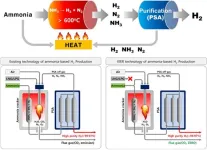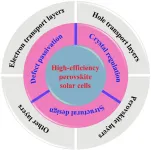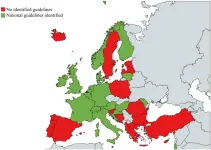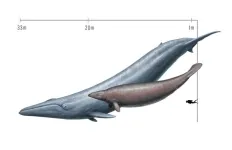(Press-News.org) The latest Canada’s Food Guide presents a paradigm shift in nutrition advice, nixing traditional food groups, including meat and dairy, and stressing the importance of plant-based proteins. Yet, the full implications of replacing animal with plant protein foods in Canadians’ diets are unknown.
New research at McGill University in collaboration with the London School of Hygiene & Tropical Medicine provides compelling evidence that partially substituting animal with plant protein foods can increase life expectancy and decrease greenhouse gas emissions. Importantly, it also suggests that benefits depend on the type of animal protein being replaced.
The study, published in Nature Food, drew data from a national nutrition survey to analyze Canadians’ dietary records. The study modeled partial replacements (25% and 50%) of either red and processed meat or dairy with plant protein foods like nuts, seeds, legumes, tofu, and fortified soy beverages, on a combination of nutrition, health, and climate outcomes.
Small dietary changes, big impact on carbon footprint
Red and processed meat and dairy are the primary contributors to Canada's diet-related greenhouse gas emissions, as evidenced in a previous study. Remarkably, this study found a person’s diet-related carbon footprint plummets by 25% when they replace half of their intake of red and processed meats with plant protein foods. On the other hand, dairy substitutions showed smaller reductions of up to 5%.
“We show that co-benefits for human and planetary health do not necessarily require wholesale changes to diets, such as adopting restrictive dietary patterns or excluding certain food groups altogether but can be achieved by making simple partial substitutions of red and processed meat, in particular, with plant protein foods,” explains Olivia Auclair, first author and recent PhD graduate in McGill’s Department of Animal Science.
Sex gap in plant-based health benefits
Diets high in animal products are known to increase the risk of heart disease, diabetes, and certain cancers. In this study, researchers estimated that if half of the red and processed meat in a person's diet was replaced with plant protein foods, they could live on average, nearly nine months longer, stemming from a reduced risk of chronic disease.
When broken down by sex, males stand to gain more by making the switch, with the gain in life expectancy doubling that for females. In contrast, partially replacing dairy with plant protein foods led to smaller gains in life expectancy and was accompanied by a trade-off: an increased calcium inadequacy by up to 14%.
“I hope our findings will help consumers make healthier and more sustainable food choices and inform future food policy in Canada,” says senior author Sergio Burgos, Associate Professor in McGill’s Department of Animal Science and scientist at the Research Institute of McGill University Health Centre.
As more people seek sustainable and health-conscious diets, the study's findings serve as a guide, empowering individuals to make informed choices that benefit both personal well-being and the planet.
“Increasing the consumption of plant-based foods alongside reductions in red and processed meat would have considerable benefits for health and the environment and would involve relatively small changes in diets for most people in Canada,” says Patricia Eustachio Colombo, co-author and Honorary Research Fellow at the London School of Hygiene & Tropical Medicine’s Centre on Climate Change & Planetary Health.
About the study
“Partial substitutions of animal with plant protein foods in Canadian diets have synergies and trade-offs among nutrition, health and climate outcomes” by O. Auclair et al. was published in Nature Food.
END
Small dietary changes can cut your carbon footprint by 25%
McGill researchers find evidence that partially replacing red and processed meat with plant protein foods can increase lifespan and mitigate climate change
2024-02-29
ELSE PRESS RELEASES FROM THIS DATE:
Uncertainty in measuring biodiversity change could hinder progress towards global targets for nature
2024-02-29
More than ever before, there is a growing interest in dedicating resources to stop the loss of biodiversity, as recently exemplified by the Kunming-Montreal Global Biodiversity Framework (GBF) decided at COP15 in December 2022. The GBF focuses on understanding why biodiversity is declining and what actions are needed to reverse this trend. However, according to researchers at McGill University, implementing the plan is challenging because information about biodiversity changes is not evenly available everywhere, and is uncertain in many places.
With the available data, can the ...
Zero emissions of carbon dioxide! Successful production of ammonia-based clean hydrogen
2024-02-29
Dr. Jung Unho's research team at the Hydrogen Research Department of the Korea Institute of Energy Research (KIER) has developed Korea's first clean hydrogen production technology. This technology is based on ammonia decomposition and does not use fossil fuels. The team's breakthrough could pave the way for a more sustainable and eco-friendly energy source. This allows for the production of high-purity hydrogen that meets international standards for hydrogen-powered vehicles, without the carbon dioxide emissions produced by using fossil fuels.
Ammonia, a compound of hydrogen and nitrogen, has a hydrogen storage density 1.7 times ...
Guiding future research on ‘extraordinary potential’ of next-generation solar cells
2024-02-29
Today’s commercial solar panels can convert about 15% to 20% of the sunlight they absorb into electrical energy — but they could be much more efficient, according to researchers at Soochow University. The next generation of solar cells has already demonstrated 26.1% efficiency, they said, but more specific research directions are needed to make such efficiency the standard and expand beyond it.
They published their review of the current state of research on high-efficiency perovskite solar cells and their recommendations for future work in Energy Materials and Devices on February 4.
“Metal halide perovskite ...
Urgent need for guidelines for the care of child victims of sexual abuse
2024-02-29
Only half of 34 surveyed European countries have national guidelines on how to provide clinical care and treatment to children who have experienced sexual abuse. This finding was revealed in a study led by researchers at Barnafrid, a national knowledge centre in the field of violence and other abuse against children, at Linköping University in Sweden. The consequences for the affected children can be severe, according to the researchers.
“Our findings suggest that children in Europe may not receive equal care. From a child rights perspective, this is unacceptable. ...
Overcoming barriers to conducting clinical trials in childhood rare disease research
2024-02-29
Using a novel methodology, researchers at The Hospital for Sick Children (SickKids) are the first in paediatric research to use data from an international real-world cohort to overcome the barriers associated with conducting randomized clinical trials in children with rare diseases.
The gold standard for evaluating new therapeutics is through randomized clinical trials, where one group of individuals receives treatment while another does not. Unfortunately, conducting this type of clinical trial proves challenging for many rare conditions due to the limited number of individuals with the condition, making meaningful comparisons difficult. Additionally, ...
Faster and simpler point-of-care malaria test developed by Rice researchers
2024-02-29
Rice University researchers have developed a rapid, accurate test for diagnosing malaria that is significantly faster and easier to use than traditional tests. The advancement has the potential to improve patient outcomes, especially in rural regions with limited health care resources.
Malaria remains a significant global health challenge with an estimated 247 million cases and more than 600,000 deaths annually, the majority of which occur in sub-Saharan Africa. The most severe form, cerebral malaria, has a high mortality ...
Investigating cell killers: Advanced system for size-dependent cytotoxicity analysis of silica
2024-02-29
Metal nanomaterials have become an indispensable part of industrial and medical fields due to their unique and versatile properties. Their size, which imparts them with the desired physiochemical properties, is also the reason for environmental and health concerns. The nano-sized particles in nanomaterials have shown high reactivity towards biomolecules and often even toxicity towards biological cells.
Scientists have attributed this behavior of metal nanoparticles in interaction with biomolecules to phenomena like inflammation or oxidative stress. However, to ensure the safe usage of metal nanoparticles, ...
Poor spatial navigation could predict Alzheimer’s disease years before the onset of symptoms
2024-02-29
People at risk of Alzheimer’s disease have impaired spatial navigation prior to problems with other cognitive functions, including memory, finds a new study led by UCL researchers.
The research, published in Alzheimer’s & Dementia: The Journal of the Alzheimer’s Association, used virtual reality to test the spatial navigation of 100 asymptomatic midlife adults, aged 43-66, from the PREVENT-Dementia prospective cohort study.
Participants had a hereditary or physiological risk of Alzheimer’s disease, due to either a gene (the APOE-ε4 allele) that puts them at risk of the condition, a family history of Alzheimer’s disease, ...
Black mountain unveils fossil trove
2024-02-29
A team of researchers led by Alexander Pohle has unveiled a treasure trove of ancient fossils from Queensland's Black Mountain. The findings, published in PeerJ Life & Environment, shed new light on the complex three-dimensional siphuncle morphology of Plectronoceratids, a pivotal group of molluscs from the latest Cambrian period.
The study surpasses the entirety of previously documented Plectronoceratid fossils, presenting over 200 well-preserved specimens. These fossils, meticulously collected by the late Mary Wade and her team during the 1970s and 1980s, offer unprecedented insights into the intricate structures of these ancient creatures.
Pohle's team focused on specimens ...
Slimming down a colossal fossil whale
2024-02-29
A 30 million year-old fossil whale may not be the heaviest animal of all time after all, according to a new analysis by paleontologists at UC Davis and the Smithsonian Institution. The new analysis puts Perucetus colossus back in the same weight range as modern whales and smaller than the largest blue whales ever recorded. The work is published Feb. 29 in PeerJ.
A fossil skeleton of Perucetus was discovered in Peru and described in a paper in Nature last year. The animal lived about 39 million years ago and belonged to an extinct group of early whales called ...
LAST 30 PRESS RELEASES:
The Lancet: First-ever in-utero stem cell therapy for fetal spina bifida repair is safe, study finds
Nanoplastics can interact with Salmonella to affect food safety, study shows
Eric Moore, M.D., elected to Mayo Clinic Board of Trustees
NYU named “research powerhouse” in new analysis
New polymer materials may offer breakthrough solution for hard-to-remove PFAS in water
Biochar can either curb or boost greenhouse gas emissions depending on soil conditions, new study finds
Nanobiochar emerges as a next generation solution for cleaner water, healthier soils, and resilient ecosystems
Study finds more parents saying ‘No’ to vitamin K, putting babies’ brains at risk
Scientists develop new gut health measure that tracks disease
Rice gene discovery could cut fertiliser use while protecting yields
Jumping ‘DNA parasites’ linked to early stages of tumour formation
Ultra-sensitive CAR T cells provide potential strategy to treat solid tumors
Early Neanderthal-Human interbreeding was strongly sex biased
North American bird declines are widespread and accelerating in agricultural hotspots
Researchers recommend strategies for improved genetic privacy legislation
How birds achieve sweet success
More sensitive cell therapy may be a HIT against solid cancers
Scientists map how aging reshapes cells across the entire mammalian body
Hotspots of accelerated bird decline linked to agricultural activity
How ancient attraction shaped the human genome
NJIT faculty named Senior Members of the National Academy of Inventors
App aids substance use recovery in vulnerable populations
College students nationwide received lifesaving education on sudden cardiac death
Oak Ridge National Laboratory launches the Next-Generation Data Centers Institute
Improved short-term sea level change predictions with better AI training
UAlbany researchers develop new laser technique to test mRNA-based therapeutics
New water-treatment system removes nitrogen, phosphorus from farm tile drainage
Major Canadian study finds strong link between cannabis, anxiety and depression
New discovery of younger Ediacaran biota
Lymphovenous bypass: Potential surgical treatment for Alzheimer's disease?
[Press-News.org] Small dietary changes can cut your carbon footprint by 25%McGill researchers find evidence that partially replacing red and processed meat with plant protein foods can increase lifespan and mitigate climate change







